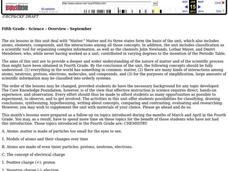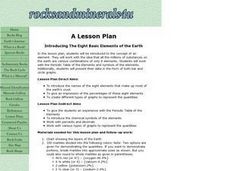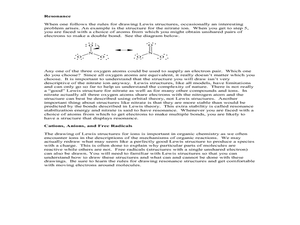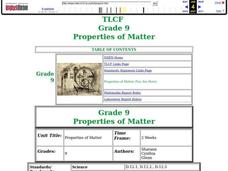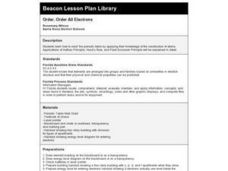Curated OER
Composition of the Atom
Students investigate the structure of the atom and its composition. In this atom structure lesson, students find the area of cut out circles and drop pens into the circles. They count the number of marks in the circles and relate their...
Curated OER
Mass Spectrometer
In this mass spectrometer worksheet, high schoolers read about how a mass spectrometer determines the elements in gases around Earth. Students answer 3 questions and identify the elements in a graph found by a mass spectrometer.
Curated OER
Atoms
Eighth graders explain what makes up matter. In this atoms lesson plan students define an atom and what its components are and identify properties of elements.
Curated OER
Let Us Bond Together
Fourth graders paricipate in a demonstration about bond strengths and bond types.
Curated OER
Matter
Fifth graders investigate the nature of matter and of the scientific processes associated with them in this series of lessons.
Curated OER
Eight Basic Elements of the Earth
Students identify the concept of an element and work with an idea that all of the millions of substances on the earth are various combinations of only 8 elements. They work with the Periodic Table of the Elements and symbols of the...
Curated OER
Changes in Nature
Fifth graders explore changes in nature. They identify chemical and physical changes in the water cycle, carbon cycle, and weathering. Students explore a chemical or physical change based on a chemical formula. They examine the effects...
Curated OER
Science 9 Unit 3 Worksheet
In this chapters 2 and 3 science guided reading worksheet, students read corresponding material pertaining chemical reactions and the periodic chart answering 40 fill in the blank questions.
Curated OER
Drawing Lewis Structures
In this drawing Lewis structures worksheet, students read about the 5 steps taken to draw Lewis structures for atoms and molecules. These include identifying the valence electrons, placing pairs of electrons between atoms to be bonded,...
Curated OER
Doing Lewis Dot Diagrams
Students observe the periodic table and draw the Lewis Dot Diagram. In this investigative lesson students construct information on several elements including the Lewis Dot Formation and take a quiz on the information they learned.
Curated OER
Inquiry into Consumer Products
High schoolers recognize different consumer products, found in and around the home, that have reactive or denaturing properties when used together. They explore chemical and physical properties of each product by identifying chemical...
Virginia Department of Education
Radioactive Decay and Half-Life
Explain the importance of radioactive half-life as your high school biologists demonstrate the concept by performing a series of steps designed to simulate radioactive decay. Pupils use pennies to perform an experiment and gather data....
Polar Trec
What Is My Footprint?
How do one's habits and lifestyle choices affect the environment? Through a short online survey, learners will calculate their own carbon footprints then determine how to reduce their impact on the environment through simple steps, such...
NOAA
Ocean Acidification
If tap water is more acidic than ocean water, why are we so concerned about ocean acidification? The third installment of a 23-part NOAA Enrichment in Marine sciences and Oceanography (NEMO) program focuses on carbon dioxide levels in...
Curated OER
If My Configurations are Correct
Students write the electron configuration of elements in the ground state. In this chemistry lesson, students draw how subatomic particles are arranged in the atom. They construct Lewis dot diagrams of valence electrons.
Curated OER
Properties of Matter
Ninth graders explore the molecular structure of matter and how it can affect the physical characteristics of a specific material. They demonstrate that isotopes of an element have different masses. Students demonstrate that the rates of...
Curated OER
Combating Corrosion
Study corrosion on bronze statues with a hands-on instructional activity. As pupils place a penny in water with salt, they observe the changes in the penny throughout a period of a week. They then analyze the pre-conservation and the...
Curated OER
The Carbon Cycle
Fifth graders examine the carbon cycle, periodic table, and photosynthesis and respiration. They analyze the periodic table and how it is organized, then complete the "Elementary, Dear Watson" worksheet. Students then examine a carbon...
Curated OER
Order, Order All Electrons
Students read the periodic table and apply their knowledge of the construction of atoms. They demonstrate reading the electron configuration of an element on the periodic file.
Curated OER
Electronegativity
Young scholars identify the type of bonding between two atoms of elements given their electronegativity values. They study the trend of electronegativity across the periodic table in small groups.
Curated OER
Isotopes of Pennies
Pupils demonstrate that isotopes of an element have different masses. They illustrate atomic mass and neutrons. The periodic table is examined in length. Display of a collection of atoms is surveyed.
Curated OER
Metals, Non-metals, Metalloids
Students discuss the physical and chemical properties of metals and non-metals. As a group, they classify items as a metal or non-metal. Using the periodic table chart, students discuss the characteristics of each metal. Based upon...
Curated OER
Classification is Sweet
Students classify, weight and organize items during this lesson. This lesson works great as or with an introduction of the Periodic Table of Elements.
Curated OER
Atomic Structure and Ionic Bonding (A Visual Approach)
Using toothpicks, marshmallows, and round colored sticky dots, physical science enthusiasts build models of an atomic nucleus. In this eighth grade chemistry lesson plan, they play an atom-naming game with the models that they have...






